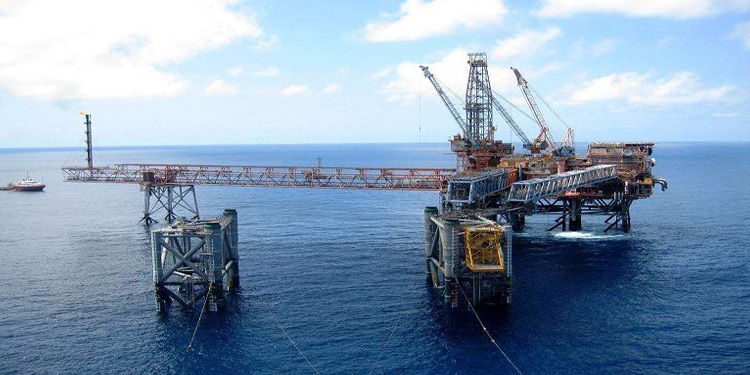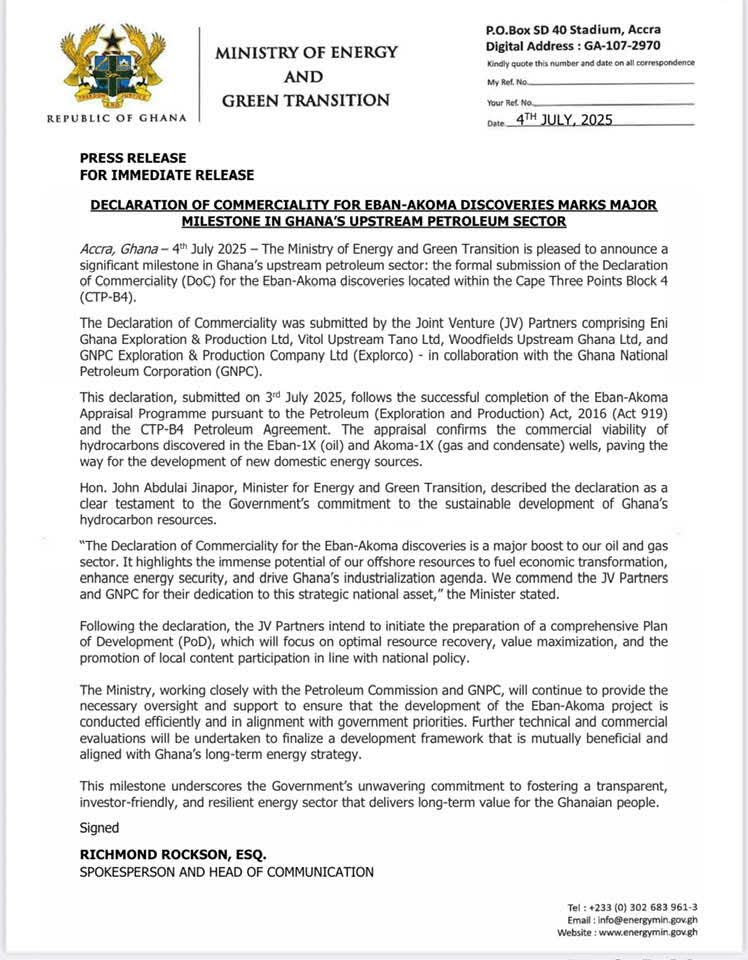Ghana’s Eban-Akoma Oil Discovery Declared Commercially Viable — What It Means for the Economy and Ordinary Ghanaians

Ghana’s quest for energy self-sufficiency and economic transformation has received a major boost following the official declaration of commerciality for the Eban-Akoma oil and gas discoveries in the Cape Three Points Block 4 (CTP-B4).
The announcement, made on July 4, 2025, by the Ministry of Energy and Green Transition, confirms that the Eban-1X and Akoma-1X wells, containing oil, gas, and condensates are commercially viable for development. This means Ghana is now positioned to unlock another layer of domestic energy resources, with direct implications for energy supply, jobs, and household stability.
Energy Security for Homes and Businesses
The Eban-Akoma development holds the promise of reducing Ghana’s dependence on imported fuel and liquefied natural gas (LNG), helping stabilize fuel prices over time. For everyday Ghanaians, this could translate to fewer power outages and less volatile electricity tariffs, key reliefs for households and businesses already struggling with the high cost of living.
Minister for Energy and Green Transition, Mr John Abdulai Jinapor, called the move a “major boost” to the oil and gas sector and emphasized its potential to drive economic transformation and support Ghana’s industrialization agenda.
A Push for Local Jobs and Industrial Growth
The Joint Venture partners, Eni Ghana, Vitol Upstream Tano, Woodfields Upstream Ghana, and GNPC’s subsidiary Explorco, are now expected to submit a Plan of Development (PoD) to lay out the roadmap for the project. The plan will prioritize not only the efficient extraction of resources but also promote local content.
That means job opportunities for Ghanaian engineers, technicians, and service providers, as well as demand for goods and logistics services that could benefit small and medium enterprises (SMEs). In practical terms, this project could inject fresh capital into Ghana’s economy and stimulate growth in secondary sectors like transport, housing, and services.
Why It Matters to the Ghanaian Household
With the Ghana cedi still under pressure and inflation affecting the cost of essential goods, a stable energy supply sourced locally can play a crucial role in shielding households from further financial shocks. Cheaper fuel and power inputs could ease production costs for local manufacturers, helping prevent price hikes on goods and services.
Moreover, increased domestic energy production reduces the country’s need to spend scarce foreign currency on energy imports, easing the strain on Ghana’s reserves and potentially supporting currency stability.
Government Oversight to Ensure Long-Term Gains
The Ministry says it will work closely with the Petroleum Commission and GNPC to ensure the project aligns with Ghana’s long-term energy plans and national interest. This includes ensuring transparency and efficiency throughout the process.
Spokesperson Richmond Rockson reaffirmed the government’s “unwavering commitment to fostering a transparent, investor-friendly, and resilient energy sector that delivers long-term value for the Ghanaian people.”
As Ghana works toward becoming an energy-secure nation, the Eban-Akoma discovery could mark a turning point, not just for policymakers and oil executives, but for everyday Ghanaians hoping for a more stable economy, more jobs, and more affordable power.





